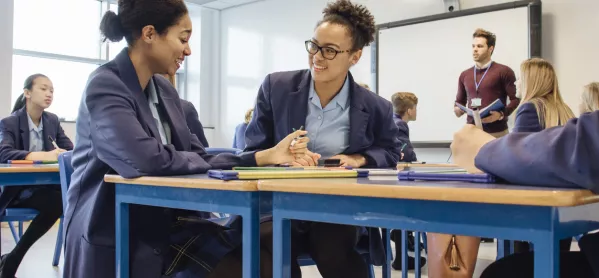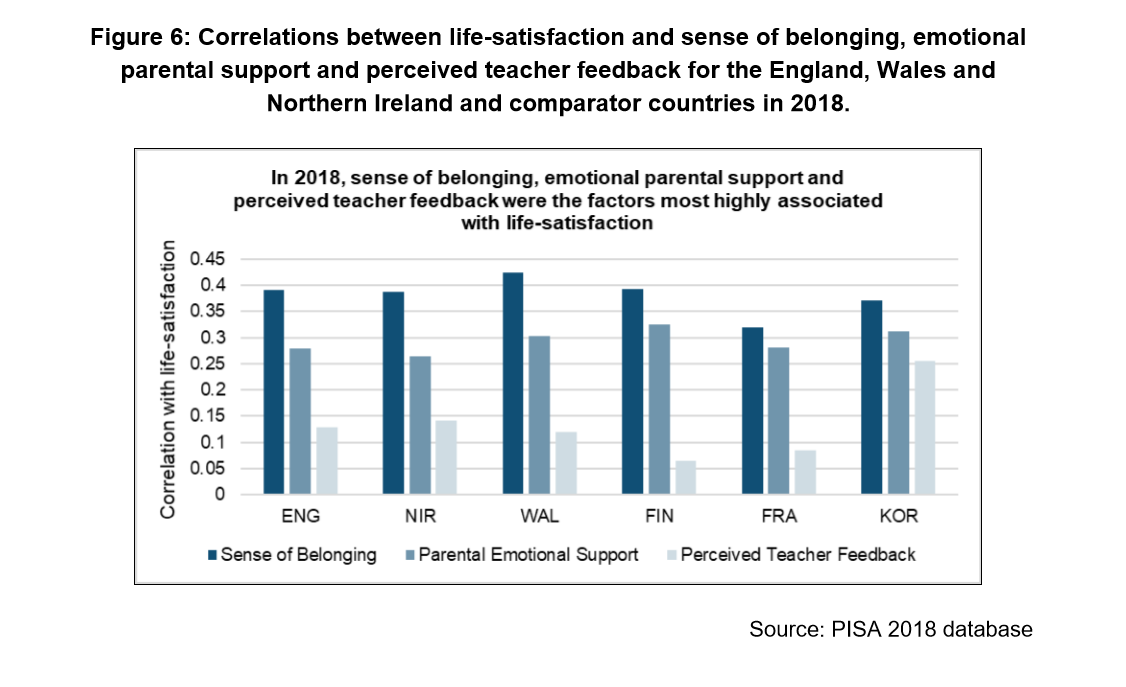Teacher feedback and school ‘climate’ key to wellbeing

Teacher feedback and a sense of belonging at school are pivotal to pupil wellbeing and educational achievement, a new report analysing data from the Programme for International Student Assessment (Pisa) reveals.
The study by the National Foundation for Educational Research (NFER) draws on data from Pisa 2018, which was published in December and showed that young people’s wellbeing had deteriorated both worldwide and across the UK since 2015.
Coronavirus: How should we talk about resilience after the pandemic?
Mental health: 94 per cent of colleges report suicide attempts
Comment: What do we need when things go back to normal? Laughter
NEFR conducted the analysis to understand how the factors that influenced student wellbeing and the learning gap for disadvantaged pupils before the pandemic could inform policy aimed at helping pupils to catch up after the crisis.
It’s findings show that feeling a sense of belonging at school was most strongly linked to higher life satisfaction, closely followed by strong relationships with parents and teachers.
Wellbeing: The importance of teacher-pupil relationships
“These findings emphasise the importance of the wider aspects of school life - of ensuring pupils have a voice, supporting positive relationships between pupils, teachers and family, and the importance of positive feedback from teachers,” the NEFR says.
Worldwide, in 2018, pupils’ sense of belonging, emotional support from parents and perceptions of teacher feedback had the highest correlations with their life satisfaction, the report says.
“Whilst teacher feedback played a smaller role than sense of belonging in school for pupils’ life-satisfaction in the UK generally, it was still the third most associated factor with life-satisfaction, after sense of belonging and parental support,” the report says.
“Feeling a close sense of connectivity within the school setting requires forming positive relationships not only with other pupils, but also with teaching staff.
“Motivated and engaging teachers play an important role in how satisfied pupils are with their lives at school.”

And when looking across all countries in the Organisation for Economic Cooperation and Development’s Pisa study, pupils who perceived more support from teachers also performed better in reading.
The new report also notes that across Pisa 2018, only between 10 and 15 per cent of pupils reported receiving “constructive and encouraging feedback, for example by providing regular feedback about a pupil’s strengths”.
And the report says that “in contrast to a decline in perceived sense of belonging, pupils in the UK reported increased teacher feedback” from 2015 to 2018, with England, Northern Ireland and Wales reporting more teacher feedback on average than other countries.
“Data from Pisa 2018 in England, Wales and Northern Ireland show that sense of belonging in school and receiving positive teacher feedback have been linked to better wellbeing,” the research says.
“But while teacher feedback increased over time, there was a significant drop in sense of belonging between 2015 and 2018 in all selected countries.
“Although teacher feedback was important, feeling a sense of belonging and forming personal relationships was linked more strongly to young people’s wellbeing and, as such, should be the focus of future interventions.”
The study also looked at whether there were common factors shared by disadvantaged pupils that did well in Pisa measures of reading, maths and science.
The analysis found that a third of disadvantaged pupils in the UK were defined as “resilient” --students who are amongst the 33 per cent most socioeconomically disadvantaged pupils in their country that achieve at or above “level 3” in Pisa reading, maths and science.
The report says resilient pupils were more likely to use metacognitive strategies (such as such as summarising texts) and to not see intelligence as fixed.
Commenting on the findings, Rebecca Wheater, research director of international large-scale assessments at the NFER, said: “These new reports provide valuable insights into our young people’s wellbeing and how best to support our disadvantaged pupils to succeed.
“Our analysis shows the importance of paying particular attention to our young people’s relationships - with their teachers, their friends, their parents - particularly in the current context when all these are harder.
“Our findings provide pointers on how we can best support disadvantaged pupils, to ensure that they are given the tools they need to succeed now and in later life.
“While the research was conducted prior to the Covid-19 pandemic, these findings, on wellbeing and our disadvantaged pupils, could not come at a more important time, as they address issues we are even more concerned about than we were when they took part in Pisa 2018.”
You need a Tes subscription to read this article
Subscribe now to read this article and get other subscriber-only content:
- Unlimited access to all Tes magazine content
- Exclusive subscriber-only stories
- Award-winning email newsletters
Already a subscriber? Log in
You need a subscription to read this article
Subscribe now to read this article and get other subscriber-only content, including:
- Unlimited access to all Tes magazine content
- Exclusive subscriber-only stories
- Award-winning email newsletters